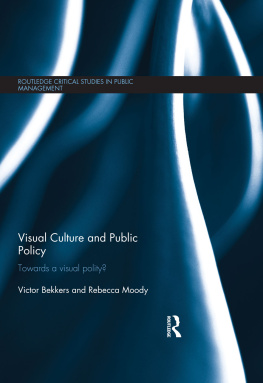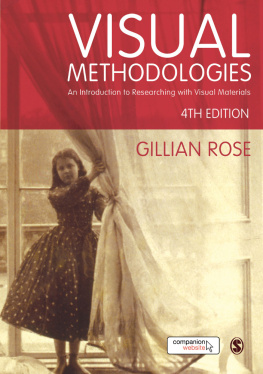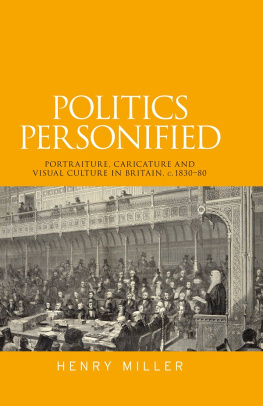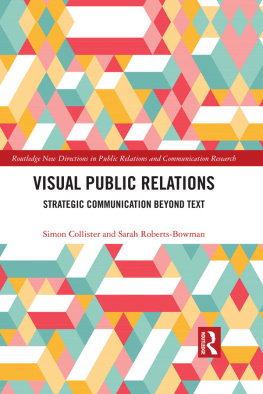Visual Culture and Public Policy
Traditionally, images have played an important role in politics and policy making, mostly in relation to propaganda and public communication. However, contemporary society is inundated with visual material due to the increasing ubiquity of media and visual technologies that facilitate the production, distribution and consumption of images in new and innovative ways. As such, a visual culture has emerged, and a number of authors have written on visual culture and the technologies which underlie it. However, a clear link to policy making is still lacking.
This book links the emergence of this visual culture to policy making and explores how visual culture (and the growing number of technologies used to create and distribute images) influence the course, content and outcome of public policy making. It examines how visual culture and policy making in contemporary society are intertwined, elaborating concepts such as power, framing and storytelling. It then links this to technology and the way this can enhance power, transparency, registration, surveillance and communication.
Dealing with the entire cycle of public policy making, from agenda setting to policy design, from decision making to evaluation, the book contains diverse international case studies including water management, risk management, livestock diseases, minority integration, racism, freedom of speech, healthcare, disaster evaluation and terrorism.
Victor Bekkers is Professor of Public Administration and Public Policy at Erasmus University Rotterdam, the Netherlands.
Rebecca Moody is Assistant Professor of Public Administration and Public Policy at Erasmus University Rotterdam, the Netherlands.
Routledge Critical Studies in Public Management
Edited by Stephen Osborne
The study and practice of public management has undergone profound changes across the world. Over the last quarter-century, we have seen
increasing criticism of public administration as the over-arching framework for the provision of public services,
the rise (and critical appraisal) of the New Public Management as an emergent paradigm for the provision of public services,
the transformation of the public sector into the cross-sectoral provision of public services, and
the growth of the governance of inter-organizational relationships as an essential element in the provision of public services.
In reality these trends have not so much replaced each other as elided or co-existed together the public policy process has not gone away as a legitimate topic of study, intra-organizational management continues to be essential to the efficient provision of public services, while the governance of inter-organizational and inter-sectoral relationships is now essential to the effective provision of these services.
Further, while the study of public management has been enriched by the contribution of a range of insights from the mainstream management literature it has also contributed to this literature in such areas as networks and inter-organizational collaboration, innovation and stakeholder theory.
This series is dedicated to presenting and critiquing this important body of theory and empirical study. It will publish books that both explore and evaluate the emergent and developing nature of public administration, management and governance (in theory and practice) and examine the relationship with and contribution to the over-arching disciplines of management and organizational sociology.
Books in the series will be of interest to academics and researchers in this field, students undertaking advanced studies of it as part of their undergraduate or postgraduate degree, and reflective policy makers and practitioners.
1 Unbundled Government
A critical analysis of the global trend to agencies, quangos and contractualisation
Edited by Christopher Pollitt and Colin Talbot
2 The Study of Public Management in Europe and the US
A competitive analysis of national distinctiveness
Edited by Walter Kickert
3 Managing Complex Governance Systems
Dynamics, self-organization and coevolution in public investments
Edited by Geert Teisman, Arwin van Buuren and Lasse Gerrits
4 Making Public Services Management Critical
Edited by Graeme Currie, Jackie Ford, Nancy Harding and Mark Learmonth
5 Social Accounting and Public Management
Accountability for the common good
Edited by Stephen P. Osborne and Amanda Ball
6 Public Management and Complexity Theory
Richer decision-making in public services
Mary Lee Rhodes, Joanne Murphy, Jenny Muir, and John A. Murray
7 New Public Governance, the Third Sector, and Co-Production
Edited by Victor Pestoff, Taco Brandsen, and Bram Verschuere
8 Branding in Governance and Public Management
Jasper Eshuis and Erik-Hans Klijn
9 Public Policy beyond the Financial Crisis
An international comparative study
Philip Haynes
10 Rethinking PublicPrivate Partnerships
Strategies for turbulent times
Edited by Carsten Greve and Graeme Hodge
11 PublicPrivate Partnerships in the USA
Lessons to be learned for the United Kingdom
Anthony Wall
12 Trust and Confidence in Government and Public Services
Edited by Sue Llewellyn, Stephen Brookes, and Ann Mahon
13 Critical Leadership
Dynamics of leaderfollower relations in a public organization
Paul Evans, John Hassard and Paula Hyde
14 Policy Transfer and Learning in Public Policy and Management
International contexts, content and development
Edited by Peter Carroll and Richard Common
15 Crossing Boundaries in Public Management and Policy
The international experience
Edited by Janine OFlynn, Deborah Blackman and John Halligan
16 PublicPrivate Partnerships in the European Union
Christopher Bovis
17 Network Theory in the Public Sector
Building new theoretical frameworks
Edited by Robyn Keast, Myrna Mandell and Robert Agranoff
18 Public Administration Reformation
Market demand from public organizations
Edited by Yogesh K. Dwivedi, Mahmud A. Shareef, Sanjay K. Pandey, and Vinod Kumar
19 Public Innovation Through Collaboration and Design










